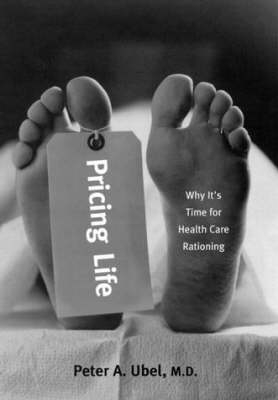
Pricing Life
Why it's Time for Health Care Rationing
Seiten
1999
MIT Press (Verlag)
978-0-262-21016-4 (ISBN)
MIT Press (Verlag)
978-0-262-21016-4 (ISBN)
- Titel ist leider vergriffen;
keine Neuauflage - Artikel merken
Focusing on health-care rationing, this text argues that physicians, health insurance companies, managed care organizations and governments need to consider the cost-effectiveness of health care technologies. The book discusses the moral questions and incorporates ethical arguments.
Although managed health care is a hot topic, too few discussions focus on health care rationing - who lives and who dies, death versus dollars. In this book physician and bioethicist Peter A. Ubel argues that physicians, health insurance companies, managed care organizations and governments need to consider the cost-effectiveness of many new health care technologies. In particular, they need to think about how best to ration health care. Ubel believes that standard medical training should provide physicians with the expertise to decide when to withhold health care from patients. He discusses the moral questions raised by this position, and by health care rationing in general. He incorporates ethical arguments about the appropriate role of cost-effectiveness analysis in health care rationing, empirical research about how the general public wants to ration care, and clinical insights based on his practice of general internal medicine. Straddling the fields of ethics, economics, research psychology and clinical medicine, he moves the debate forward from "whether" to ration to "how" to ration. The discussion is enlivened by actual case studies.
Although managed health care is a hot topic, too few discussions focus on health care rationing - who lives and who dies, death versus dollars. In this book physician and bioethicist Peter A. Ubel argues that physicians, health insurance companies, managed care organizations and governments need to consider the cost-effectiveness of many new health care technologies. In particular, they need to think about how best to ration health care. Ubel believes that standard medical training should provide physicians with the expertise to decide when to withhold health care from patients. He discusses the moral questions raised by this position, and by health care rationing in general. He incorporates ethical arguments about the appropriate role of cost-effectiveness analysis in health care rationing, empirical research about how the general public wants to ration care, and clinical insights based on his practice of general internal medicine. Straddling the fields of ethics, economics, research psychology and clinical medicine, he moves the debate forward from "whether" to ration to "how" to ration. The discussion is enlivened by actual case studies.
| Erscheint lt. Verlag | 4.1.2000 |
|---|---|
| Reihe/Serie | Basic Bioethics |
| Zusatzinfo | 18 |
| Verlagsort | Cambridge, Mass. |
| Sprache | englisch |
| Maße | 158 x 236 mm |
| Gewicht | 499 g |
| Themenwelt | Medizin / Pharmazie ► Gesundheitswesen |
| Medizin / Pharmazie ► Medizinische Fachgebiete ► Medizinethik | |
| Studium ► Querschnittsbereiche ► Geschichte / Ethik der Medizin | |
| Wirtschaft ► Volkswirtschaftslehre | |
| ISBN-10 | 0-262-21016-9 / 0262210169 |
| ISBN-13 | 978-0-262-21016-4 / 9780262210164 |
| Zustand | Neuware |
| Haben Sie eine Frage zum Produkt? |
Mehr entdecken
aus dem Bereich
aus dem Bereich
Die Geschichte eines Weltzentrums der Medizin von 1710 bis zur …
Buch | Softcover (2021)
Lehmanns Media (Verlag)
17,95 €
von der Antike bis zur Gegenwart
Buch | Softcover (2024)
C.H.Beck (Verlag)
12,00 €
Krankheitslehren, Irrwege, Behandlungsformen
Buch | Softcover (2024)
C.H.Beck (Verlag)
39,95 €


